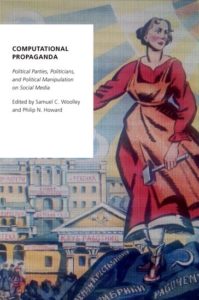 Is the DC-based Foreign Policy Research Institute the latest victim of an online disinformation program? Aaron Stein, the Director of the Middle East Program and a 2019 Templeton Fellow at the Foreign Policy Research Institute makes the case here.
Is the DC-based Foreign Policy Research Institute the latest victim of an online disinformation program? Aaron Stein, the Director of the Middle East Program and a 2019 Templeton Fellow at the Foreign Policy Research Institute makes the case here.
Computational warfare and disinformation campaigns will, in 2020, become a more serious threat than physical war, and we will have to rethink the weapons we deploy to fight them, argues Sean Gourley, founder and CEO of Primer.
The asymmetry in this fight is that democracies are more susceptible to manipulation than authoritarian and totalitarian regimes designed to suppress individual freedom of thought and the open flow of information, he writes for WIRED. What’s at stake is democracy itself – and, importantly, a very fine line for democratic governments to walk between censorship and freedom of speech. In 2020, we will begin to weaponize truth.
Over the years, sadly, we have seen many authoritarian countries prove capable of not just managing the political impact of technology but harnessing it toward greater geopolitical goals outside their borders, the National Endowment for Democracy‘s Shanthi Kalathil tells She The People.

Computational Propaganda
But internet shutdowns in India prove it’s not just authoritarians who repress online, says Justin Sherman (@jshermcyber), a cybersecurity policy fellow at New America. As a democracy with nearly 1.4 billion people, and with a rapidly growing digital economy, India’s actions in the cyber sphere have pronounced impacts around the world, he writes for WIRED:
Nations with less-developed or less-regulated internets will look to India, the US, Japan, the UK, Australia, and other democratic powers for guidance on internet governance. As we rightfully continue to call out and combat digital authoritarianism and internet shutdowns in dictatorships, we should remember to also do so when democracies engage in the same repressive behaviors.
Insufficient responses to malign information operations of state and non-state actors are caused by a variety of institutional and operational deficiencies, retired US Foreign Service Officer Deborah A. McCarthy argues in “US Foreign Policy Tools in the Era of Disinformation,” a Briefing Paper for the Finnish Institute of International Affairs.







